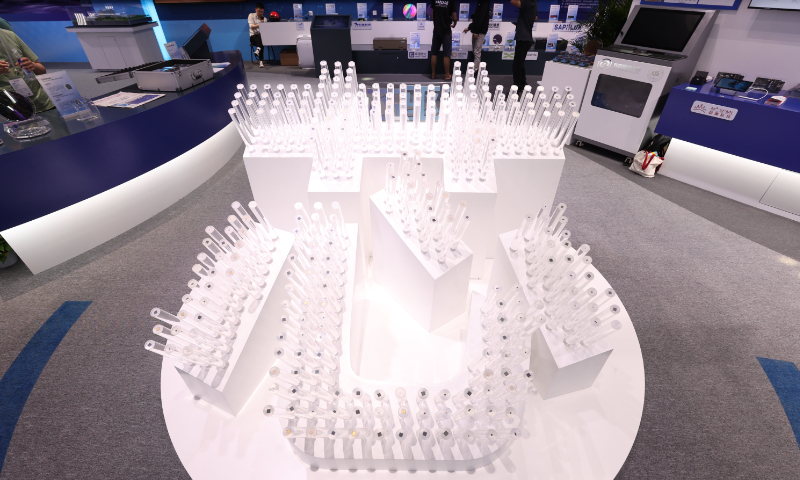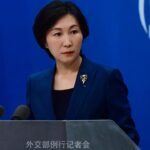Results underscore direction of China’s push for sci-tech innovation: experts
The 2023 Zhongguancun (ZGC) Forum wrapped up on Tuesday after several days of meetings and exhibitions in Beijing, with officials announcing major achievements such as the unveiling of scientific and technological advances and the signing of billions of dollars worth of deals.
The achievements at the Forum, a state-level platform for global technological exchanges and cooperation based in Beijing’s Zhongguancun area, underscored China’s focus on sci-tech self-reliance and strength in key areas, as well as its commitment to global sci-tech cooperation despite calls for a so-called tech decoupling, experts noted.
At the meeting on Tuesday afternoon marking the conclusion of this year’s forum, 20 major sci-tech achievements were unveiled covering cutting-edge technologies including semiconductors, artificial intelligence (AI), telecommunications and satellites.
Also, at the meeting, the National Council for Social Security Fund announced a special fund for independent innovation in Zhongguancun with the initial amount reaching 5 billion yuan ($706.54 million).
Dozens of foreign-funded research and development (R&D) centers in Beijing, including those of German conglomerate Siemens, US technology giant Intel and British-Swedish multinational pharmaceutical AstraZeneca were awarded licenses at the meeting on Tuesday.
“With the joint support and efforts of all parties, the forum has given full play to its function as a national platform with high-level, international and comprehensive features,” Yu Yingjie, vice mayor of Beijing, said at the meeting.
According to Yu, more than 200 foreign organizations and institutions participated in the forum, while 165 foreign businesses took part in the exhibition area, and more than 5,000 scientists, investors and innovation workers from 86 countries and regions attended in person.
More than 1,160 guests delivered speeches at the forum, which drew nearly 80,000 members of the public. Also, at least 129 projects worth more than 81 billion yuan were signed during the forum.
“The ZGC Forum has achieved fruitful results in many aspects,” Yu said. “It has become a golden opportunity for global sci-tech exchanges and cooperation.”
While some Western countries are pushing for a technological decoupling and imposing restrictions on technological exchanges with China, the participation of scientists, including Nobel Prize laureates, also showed that the ZGC Forum offered a better opportunity for sci-tech exchanges, Wang Peng, a research fellow at the Beijing Academy of Social Sciences, told the Global Times on Tuesday.
Wang noted that with Beijing’s unique advantages in the size of the market and talent pool and the concentration of industry leaders as well as intensifying policy support, the city will continue to play a leading role in spearheading China’s sci-tech advances in cutting-edge technologies and breaking through foreign containment attempts.
Amid China’s push for sci-tech self-reliance and strength in a time of fierce global competition, China is aiming to build Beijing into a global sci-tech innovation hub by 2025. The city’s creativity, competitiveness and influence in innovation are expected to reach the top level globally by 2035.
Under this strategy, Beijing has rolled out a series of measures to support sci-tech innovation.
On Tuesday, the Beijing Zhongguancun Comprehensive Bonded Zone was officially launched after being approved by the State Council, China’s cabinet.
Comprehensive bonded zones are special commercial areas that enjoy favorable taxation policies and are managed by customs authorities. The Zhongguancun Comprehensive Bonded Zone is the first such zone that focuses specifically on R&D and innovation, according to officials.
During ZGC Forum, Beijing held the 2023 Invest Beijing Global Summit, where Chinese and foreign companies signed investment deals worth over 60.8 billion yuan covering 39 projects in the city’s high-tech sectors such as smart vehicles, medicine and health, and intelligent manufacturing, official data showed.
Also on Tuesday, Beijing announced measures to accelerate the development of AI in the city, aiming to build a world-leading industry around the rapidly emerging technology. Among other moves, the city will build an open source and open platform for large model algorithms and tools, and promote breakthroughs in domestic AI chips, according to a notice announcing the measures.
“I think the policy measures issued by Beijing actually have great demonstration effects and positive spillover effects for the rest of the country,” Wang said, adding that creating a favorable environment for innovation and promoting sci-tech breakthroughs through such measures will help the upgrading of traditional industries and lead to breakthroughs in bottleneck technologies that might hold back the country’s development.
(Global Times)




